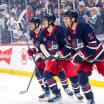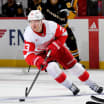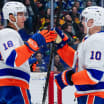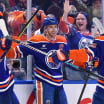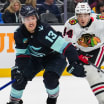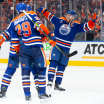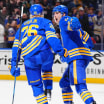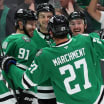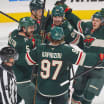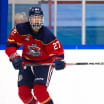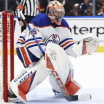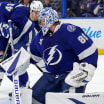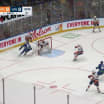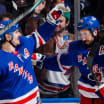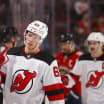In NHL.com's Q&A feature called "Sitting Down with …" we talk to key figures in the game, gaining insight into their lives on and off the ice. Today, we feature Detroit Red Wings vice president of hockey operations Nicklas Lidstrom.
Lidstrom talks transition to new role with Red Wings in Q&A with NHL.com
Hall of Fame defenseman also discusses Detroit prospects, working for GM, former teammate Yzerman
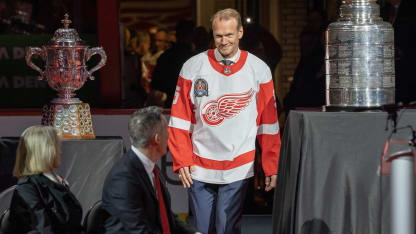
© Dave Reginek/Getty Images
DETROIT -- Imagine reading a scouting report, looking at the byline and seeing the name Nicklas Lidstrom.
"I read his reports now," said Hakan Andersson, the Detroit Red Wings' director of European scouting. "And they're really good, I have to say."
Of course they are.
There is a reason Lidstrom earned the nickname "The Perfect Human," and there is a reason the Red Wings hired him as vice president of hockey operations Jan. 11.
Lidstrom won the Stanley Cup four times with the Red Wings, in 1997, 1998, 2002 and 2008. In 2002, he became the first player from Europe to win the Conn Smythe Trophy as the most valuable player of the Stanley Cup Playoffs, and in 2008, he became the first European to captain a Cup champion.
He won the Norris Trophy seven times, tying Doug Harvey for second to Bobby Orr, who was voted the NHL's best defenseman eight times.
On Nov. 17, at a gala celebrating the 100th anniversary of the Swedish Ice Hockey Federation, he was named the greatest Swedish hockey player of all time.
Now the 52-year-old is learning to be an executive, working under his former teammate and fellow Hockey Hall of Famer, Red Wings general manager Steve Yzerman.
Based in his hometown of Vasteras, Sweden, Lidstrom comes to North America on occasion. He attended a prospects tournament and Red Wings training camp in Traverse City, Michigan, in September, and he spent a few days in Detroit in November.
Mostly, he scouts three or four games a week at different levels in Sweden, following players the Red Wings have drafted, looking for players they might want in the future, writing reports.
"It'll be a Friday night, he's at a junior game," Andersson said. "It's pretty impressive. And the reports I've seen so far, I like. He knows what he's looking for. It certainly looks like his great knowledge of the game can carry over."
Lidstrom shared his thoughts on his new job, a couple of Red Wings prospects and Yzerman as a boss in a Q&A with NHL.com.
What's life like for you on a day-to-day basis?
"Vasteras is very centrally located, about an hour outside of Stockholm. I can cover a lot of teams. Some of the teams down south or up north, I hop on a plane and fly there, but most places I drive.
"I watch a lot of games, and I write reports, send reports in. I see our prospects after games. I just meet them after games, talk to them a little bit and give them some encouraging words or just some help, feedback.
"And when I'm over [in North America], I try to be close to the team, close to 'Stevie,' what he's doing.
"I try to dip my toes into a little bit of everything to learn everything. As you know, I started in January, so everything is kind of new and fresh for me so far."
Is it what you thought it would be? Why would someone with your resume write scouting reports?
"I wanted to do that. I wanted to learn that side of it as well, how to look at players. You go back and look at some of the notes you made last season and compare to what you're looking at now."
How differently do you look at the game in this role? When you processed the game at the highest level as a player, is it hard to evaluate players who, well, don't?
"Yeah, I understand the question. I try to look at the positive sides you see in a player and some of the things that need to improve. I kind of look at it that way.
"Some games, you kind of lose track of what the score is, because you're not really paying attention to the score. You're looking at the players. It's more the players and individuals than the actual game."
Has anyone had to teach you how to watch like a scout?
"I talk to Hakan a little bit. We watched some games together early on. I was just kind of asking him a few questions about what he sees in a player to see if we see the same things, if we see something different. I try to pick his brain a little bit.
"And you learn a lot from reading reports too. You watch the player, and then you read the reports to if you see similar things."
What do you think of Simon Edvinsson, the No. 6 pick of the 2021 NHL Draft, who came to North America this season? The 6-foot-4 defenseman has nine points (one goal, eight assists) in 13 games for Grand Rapids of the American Hockey League.
"I think Simon had a good training camp, but I thought he was probably better off playing a lot of minutes in Grand Rapids -- a lot of both power play and penalty kill. He's kind of getting to know how to play, be an everyday player. In the NHL, you might not play power play, you might get less ice time, and it's good for him. He's a young player. He's only 19, so it's a good place for him to start, I think."
How about William Wallinder, a second-round pick (No. 32) in the 2020 NHL Draft? Another 6-foot-4 defenseman, the 20-year-old has 13 points (four goals, nine assists) in 20 games for Rogle of the Swedish Hockey League.
"Wallinder is taking steps from last year when I saw him. He's playing more. He's getting more minutes. He's playing top minutes on his team, plays the most minutes on defense. He gets to play all situations. So, he's improved, looks stronger on the ice. His skating is better. Overall, he's been taking steps, I would say. He's taking steps into becoming better."
What's it like having Yzerman as your boss?
"He wants to know what you've seen, what you're looking at. He's reading reports as well. We'll bounce some questions back and forth, and I ask him about the team here and how they're doing. I watch a little bit from overseas, but you can't watch everything.
"He's really into the details of a player. He's very knowledgeable of the players that I've watched. He'll watch them on video or whatnot. I enjoy working for him. It's been good. I've known him for so long as a player and as a teammate, and now he's in management.
"It's been something new for me being part of management and kind of getting a different perspective on what it takes to win. As a player, you're just focused on next practice, next game. You're looking at the schedule. Now you're looking at a wide range of things, from different players that can play down the road and players that you can fit right in now. Everything seems to be so much bigger and broader."
